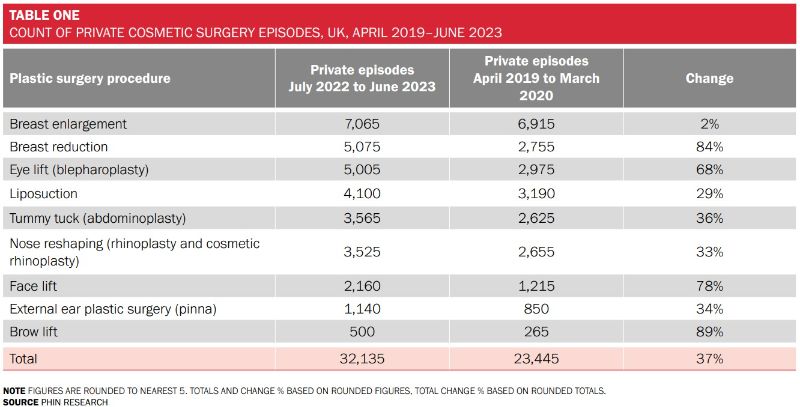In a column written for the Healthcare Markets Magazine, Greg Swarbrick, Strategic Projects, looks at the data on the most popular cosmetic procedures and the sort of information which should be highlighted to patients considering this treatment, as well as how this information can be used to attract and reassure patients.
Cosmetic surgery is a subset of plastic surgery in which patients seek to have improvements to their aesthetic appearance. This type of surgery is not routinely funded by the NHS and is usually conducted in private healthcare. The patient usually pays for the procedure themselves, though in some cases a private medical insurer will provide the funding if there is an associated medical reason for treatment.
People have cosmetic surgery for a wide number of reasons. These are mostly related to physical appearance but there can be psychological reasons associated with this, especially body confidence and self-esteem.
Cosmetic surgery can take place within a hospital, but it’s increasingly popular for it to take place in a dedicated facility which might even be on the high street. At present 9 out of 10 patients are female, though increasing numbers of men are having cosmetic facial surgery.
What are the most popular procedures?
The table below shows the count of cosmetic procedures in the UK as reported to PHIN by private hospitals and facilities. Breast-related cosmetic surgery has the highest volumes, followed by eye lifts and liposuction. While overall numbers pre- and post-Covid are broadly the same, by volume the significant changes include:
- fewer people having breast enlargement – which may be done for more aesthetic reasons
- more having breast reductions – which may be done for more practical purposes, including to reduce back pain
- a large increase in people having eye lifts.

Considerations medical professionals asked about recommendations and for providers in promoting their services.
In the UK safety is good due to strong regulations. This can mean higher prices than in other countries, but there is also greater protection for consumers. There have been many reports in recent years of people receiving poor treatment or, tragically, not even returning from treatment abroad, where clinical standards may be lax. With cheap surgery, patients get what they pay for, so providers should highlight safety records and the reasons that costs can be higher in the UK.
One area to demonstrate this is that every clinical site should be CQC-registered and follow the right protocols, and should also have a complaints process. Private facilities are encouraged to have those processes validated by ISCAS – Independent Sector Complaints Adjudication Service (cedr.com). Providers should ensure patients are aware of their complaints process..
While there are very many highly professional plastic and cosmetic surgeons in the UK, it’s also true that there are more complaints about plastic surgery than for any other specialty. Rogue surgeons operate under the radar, without registration with relevant bodies – so patients need to be made aware of how important their own research is. Reputable providers should ensure they have supplied all the relevant data to PHIN and address the key issues on their websites and in their marketing materials.
The President of the British Association of Aesthetic and Plastic Surgeons, Marc Pacifico, recommends that patients should find out about their consultants’ qualifications and assure themselves about their competence before having treatment.
Patients should always ask their consultant about all aspects of their proposed surgery; a good consultant will be comfortable to explain everything, and won’t put any pressure on the patient. Topics for the consultant to cover with the patient include their reasons for having treatment, and the consultant should give realistic expectations about treatment outcomes. Perfection doesn’t exist and surgeons can’t perform magic, but professionally-qualified consultants can and do achieve excellent outcomes, but no surgeon can guarantee the result they can achieve for a patient. Ideally the patient should have two consultations before surgery, in order to ensure they have had time to reflect and feel confident about their treatment plan.
Patients should also be told about the risk of complications after surgery – these can occur, so it’s worth being upfront about them from the start. Surgeons have legal responsibility to talk through potential risks, and the patient should then sign a form to acknowledge this. Patients need to know to be wary of any consultant who is dismissive of the risks or evasive.
Uniquely in surgery, cosmetic surgery is significantly promoted via the internet and by social influencers. However, in order to have reassurance about getting good outcomes, there are various things patients need to be encouraged to do when researching cosmetic treatments.
As well as speaking with any friends or family who’ve had cosmetic surgery, patients should be encouraged to look up the websites of organisations and professional bodies who can provide expert guidance in their field, for example:
- The British Association of Aesthetic Plastic Surgeons The British Association of Aesthetic Plastic Surgeons (baaps.org.uk)
- British Association of Plastic and Reconstructive Surgeons Home | BAPRAS
- The British Association of Otorhinolaryngology (Ear, Nose and Throat and related specialties) ENT UK
- The Association of Breast Surgery Association of Breast Surgery
- British Association of Oral and Maxillofacial Surgeons https://www.baoms.org.uk/default.aspx#MainForm
- British Oculoplastic Surgery Society https://www.bopss.co.uk/
Hospitals and clinics should ensure, and patients can check, that their consultants are included on lists by relevant and recognised professional bodies. This is preferable to taking advice from online influencers who aren’t medically qualified, or those who may be incentivised online to promote treatments and who may not even know the pros and cons of surgery, let alone what is right for each individual patient.
- All consultant surgeons performing cosmetic surgery should be on the GMC specialist register, see https://www.gmc-uk.org/registration-and-licensing/the-medical-register
- The Royal College of Surgeons website provides assurance about surgeons who carry out a sufficient number of procedures that they fulfil standards of training and clinical skills: Certified Cosmetic Surgeons — Royal College of Surgeons (rcseng.ac.uk)
- BAAPS also has a consultant finder by procedure and region which can also provide reassurance that the surgeon’s work aligns with necessary professional and ethical codes of conduct. Find a Surgeon | The British Association of Aesthetic Plastic Surgeons (baaps.org.uk)
Gathering evidence
During 2022-23 PHIN has focused on improving evidence of treatment effectiveness and quality for surgical interventions, such as cataracts, knee and hip replacements, using patient-reported outcome measures (PROMs). The private sector is doing a big push on the same for cosmetic interventions and PHIN is keen to support providers in their collection of PROMs to enable this.
Part of the context for this drive is the unnecessary and harmful surgery exposed in the Paterson inquiry, and the PIP breast implant scandal before that. While we recognise that completion of PROMs requires additional time and effort, it can be immensely helpful both for existing patients and their clinicians if used well. PROMs are also evidence for future patients when considering surgery, and for hospitals wishing to guarantee, and market, the quality of their outcomes.
An additional level of challenge exists with cosmetic PROMs, as there’s a subjective dimension to satisfaction with an aesthetic outcome. This is different to asking a patient after hip surgery whether they still have pain or can carry out everyday tasks. Instead we’re asking aspects such as, ‘Are you happy with your new nose?’ Even the best surgery in the world may not satisfy everyone, particularly if their expectations haven’t been effectively managed.
Early feedback that PHIN has collected indicates however that the vast majority of patients are satisfied with their treatments, but there is variation. If we can collect greater numbers of PROMs then we will have a better understanding of what drives better outcomes and where focus is needed to make improvements.
Two of the cosmetic PROMs PHIN collects feedback on are breast enlargement and rhinoplasty. The cosmetic measures, known as Q-PROMs (see https://qportfolio.org/) have required rigorous development, validation, and testing and are now used in several European countries as well as the USA, both in clinical trials and guidance as well as registries. Furthermore analysis of the data has significantly helped understanding of outcomes in the field of plastic surgery.
The two pie charts below show data collected in the past year before efforts to promote the PROMs had started. You can see that there is variation between satisfaction levels for these cosmetic procedures, but these are still small response numbers and so are possibly not fully representative. There is a risk that only those very satisfied or very unsatisfied might complete the survey, so it’s essential that we get more clinicians and patients engaged so that we can identify any patterns that drive better or worse satisfaction.

PHIN has been collecting surveys of patient satisfaction about their consultants for many years. For plastic surgeons we see very positive responses where this is reported to PHIN. The numbers below are based on over 16,000 responses collected over the past three years:
- 91% of patients would recommend their consultant
- 95% felt that their consultants explained everything in a way that was easy to understand
- 89% said that they had sufficient time with their consultant during their treatment
- 96% reported having confidence that their consultant would deliver appropriate care
- 96% said their consultant showed understanding when assessing their need for treatment.
PHIN is keen to promote the collection of evidence for cosmetic surgery and similarly to enable patients, clinicians and hospitals alike to promote best practice and informed choices about quality.
A helping hand
There is a lot for patients to consider when looking into cosmetic surgery. Medical professionals and providers can support their decision making by providing the relevant information and highlighting what patients should look for (and what they should watch out for!). PROMs will have an important role to play in providing evidence for outcomes as more data is collected and published. This should mean that cosmetic surgery patients opt for the provider that’s right for them and not just the cheapest.
